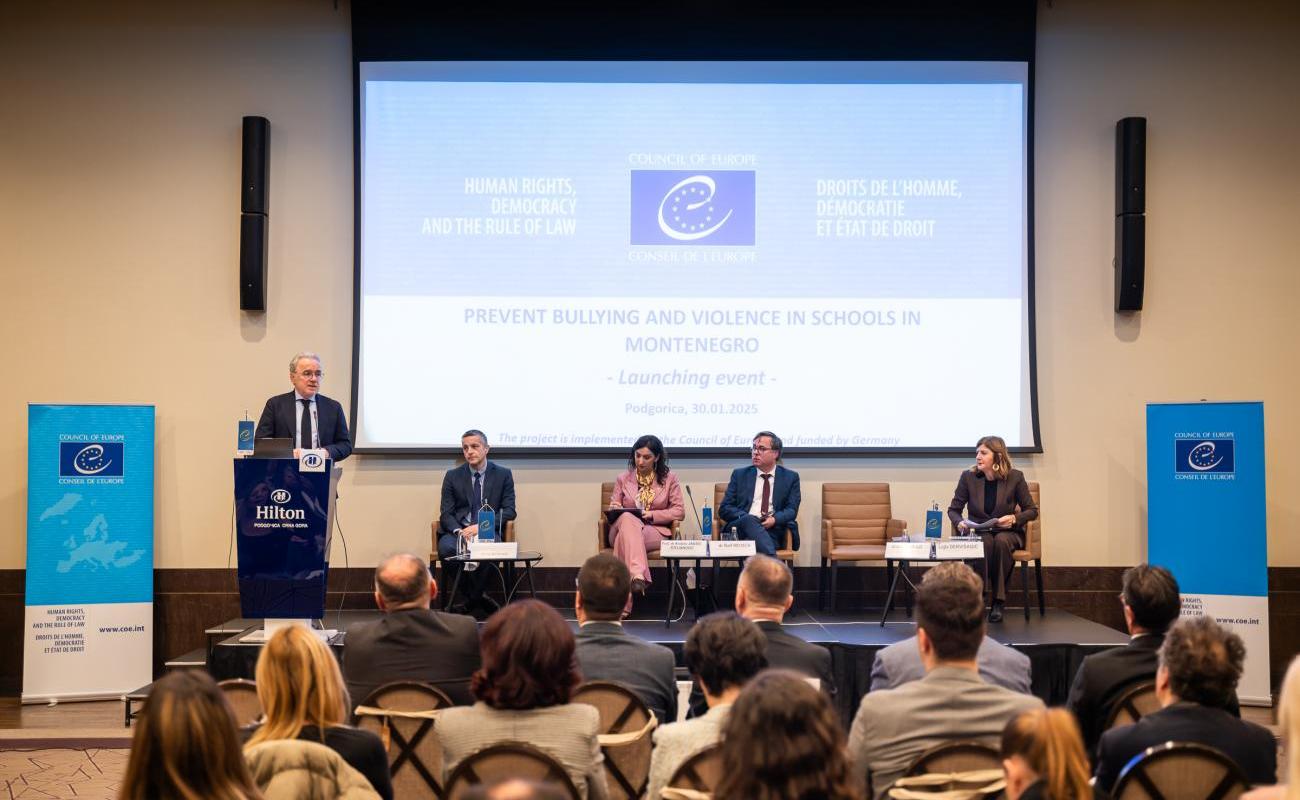Launching of the project “Prevent bullying and violence in schools in Montenegro”

The project “Prevent bullying and violence in schools in Montenegro”, implemented by the Council of Europe and financed by the Federal Republic of Germany, was officially launched in Podgorica on 30 January 2025. More than 60 participants - representatives of relevant ministries and state institutions, parliament, diplomatic corps, and international and non-governmental organisations, attended the event.
The project started in December 2024 and will last two years. It aims to enhance the system for the prevention and protection of children from cyber and other forms of bullying, and peer violence in schools in Montenegro.
Attendees at the event were addressed by prof. Dr Anđela Jakšić Stojanović, Minister of Education, Science and Innovation; Dr Ralf Reusch, Deputy Head of Mission at the Embassy of the Federal Republic of Germany in Montenegro; Villano Qiriazi, Head of the Education Department at the Council of Europe and Lejla Dervišagić, Head of the Council of Europe Programme Office in Podgorica.
The Ministry of Education, Science and Innovation is the main institutional partner in the implementation of the project and planned project activities will bring together representatives from other relevant institutions in the fields of education, social protection, health, youth care, human rights, as well as representatives of non-governmental and international organisations.
Minister Jakšić-Stojanović pointed out that the project aims to create a safe and supportive environment for every child. She emphasised that schools are not only places for acquiring knowledge, but spaces where children build values, self-confidence and mutual respect, which is why it is crucial that they are safe and free from violence. With the support of the Council of Europe and the Federal Republic of Germany, the project will improve the system of prevention and protection of children, strengthen the cooperation of all actors in education and bring concrete measures against violence. Through research, practical tools and teacher education, schools will be supported to respond responsibly and effectively to any form of violence. "The Ministry of Education, Science and Innovation remains committed to long-term changes that will ensure that schools are safe places of growth, learning and mutual respect," she said. At the end, Minister Jakšić-Stojanović thanked all partners who recognised the importance of this initiative and expressed their willingness to work together on its realisation.
The Federal Republic of Germany supports numerous projects of the Council of Europe, as well as other partners, on topics of importance for the wider social community and prevention of violence is one of them. Dr. Reusch expressed his belief that the project “Prevent bullying and violence in schools in Montenegro” will further strengthen Montenegro’s already strong record in human rights. It is also relevant for the EU accession process and the closure of Chapter 23 on the judiciary and fundamental rights. He reminded participants that 2025 marks the 75th anniversary of Germany's accession to the Council of Europe and the drafting of the European Convention on Human Rights. "Therefore, we are very pleased that we have the opportunity to support the Council of Europe and Montenegro in the jubilee year in this important project," concluded Dr. Reusch.
“The Council of Europe is deeply committed to addressing the issues of peer and cyber violence, which represent significant challenges to our education systems. This area is especially significant for the Education Department, which focuses on preventative mechanisms, and our project in Montenegro reflects this commitment. We want schools to be safe environments, where children can learn, develop and socialise, free from fear of bullying or violence", said Mr. Qiriazi in his speech.
Ms Dervišagić emphasised that the Council of Europe Programme Office in Podgorica provides support and partnership cooperation to Montenegro through various projects in numerous areas such as the judiciary, law enforcement, protection of victims' rights, freedom of expression and freedom and media freedom, anti-corruption, combating economic crime, quality education for all, anti-discrimination, preventing and combating online child sexual exploitation and abuse, Roma integration, and deliberative democracy. "All these areas are interconnected, and we will coordinate them with this new project, as well as with our local and international partners and beneficiaries”, she concluded.
Vesna Atanasova, Head of the Unit for Formal and Informal Education in the Council of Europe, presented the project's goals, activities and expected outcomes. In particular, she announced that the project planned comprehensive research on preventing violence in schools, including cyber violence, students, parents and teachers, and representatives of relevant institutions and organisations. The research will be the basis for other project activities.
The delegation of the Council of Europe had a special meeting with Minister Jakšić Stojanović to discuss other activities, projects and initiatives that the Council of Europe is working on in education.
Finally, the Project Steering Committee held its first meeting, bringing together key institutional representatives to review the work plan and establish a framework for collaboration.
